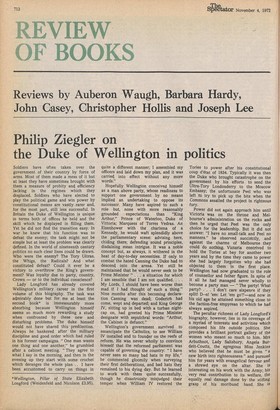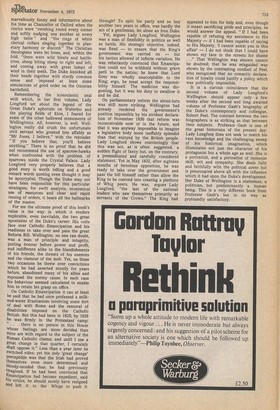Philip Ziegler on the Duke of Wellington in politics
Soldiers have often taken over the government of their country by force of arms. Most of them made a mess of it but at least they have sometimes brought with them a measure of probity and efficiency lacking in the regimes which they displaced. Soldiers who have elected to play the political game and win power by constitutional means are vastly rarer and, for the most part, still less successful. In Britain the Duke of Wellington is unique in terms both of offices he held and the skill which he displayed in filling them. Yet he did not find the transition easy. In war he knew that his function was to defeat the enemy; the task might not be simple but at least the problem was clearly defined. In the world of nineteenth century politics no such clear lines could be drawn. Who were the enemy? The Tory Ultras, the Whigs, the Radicals? And what constituted defeat? Could it ever be a victory to overthrow the King's government? Was loyalty due to party, country, Crown — or to the individual conscience?
Lady Longford has already covered Wellington's military career in the first volume of this biography. The task was admirably done but for me at least the second book* is immeasurably more absorbing because Wellington himself seems so much more rewarding a study when confronted by these new and disturbing problems. The duke himself would not have shared this predilection. Always he hankered after the military discipline and good order which had ruled in his former campaigns. "One man wants one thing and one another," he grumbled after a cabinet meeting. "They agree to what I say in the morning, and then in the evening up they start with some crochet which deranges the whole plan .. I have been accustomed to carry on things in quite a different manner; I assembled my officers and laid down my plan, and it was carried into effect without any more words."
Hopefully Wellington conceived himself as a man above party, whose readiness to support one government by no means implied an undertaking to oppose its successor. Many have aspired to such a role but, none with more reasonably grounded expectations than "King Arthur," Prince of Waterloo, Duke of Vittoria; Marquess of Torres Vedras. An Eisenhower with the charisma of a Kennedy, he would waft splendidly above the parliamentary scene: advising here, chiding there; defending sound principles, disdaining mean intrigue. It was a noble concept but, as always, it withered in the heat of day-to-day necessities. If only to combat the hated Canning the Duke had to descend into the arena. Yet still he maintained that he would never seek to be Prime Minister " . . . a situation for which I am sensible that I am not qualified. . . . My Lords, I should have been worse than mad if I had thought of such a thing." Nine months after this becoming declaration Canning was dead; Goderich had come, wept and departed; and King George IV, sitting up in bed with a turban nightcap on, had greeted his Prime Minister designate with sepulchral words: "Arthur, the Cabinet is defunct."
Wellington's government survived to emancipate the Catholics, to see William IV installed and to founder on the reefs of reform. He was never wholly to convince himself that the reformed parliament was capable of governing the country: "I have never seen so many bad hats in my life," he commented gloomily when surveying their first deliberations, and bad hats they remained to his dying day. But he learned to work with them quite successfully, though he disastrously misjudged their temper when William IV restored the Tories to power after his constitutional coup d'etat of 1834. Typically it was then the Duke who brought catastrophe on the government by his efforts to send the Ultra-Tory Londonderry to the Moscow Embassy; the unfortunate Peel who was left to try to pick up the bits when the Commons assailed the project in righteous fury.
Power did not again approach him until Victoria was on the throne and Melbourne's administration on the rocks and then he urged that Peel was the only choice for the leadership. But it did not answer: "I have no small-talk and Peel no manners." he observed succinctly, and against the charms of Melbourne they could do nothing. Victoria contrived to hold the Tories at bay for another two years and by the time they came to power she had largely forgotten why she had objected to them in the first place. Wellington had now graduated to the role of counsellor and father figure. In spite of it all he had managed never wholly to become a party man — "The party! What party? . . . I don't care sixpence if they split! D--n! 'em: Let 'em go'!'—and now in his old age he attained something close to the faction-free empyrean to which he had always aspired.
The peculiar richness of Lady Longford's biography, however, lies in its coverage of a myriad of interests and activities which composed his life outside politics. She provides a brilliant portrait gallery of the women who meant so much to him. Mrs Arbuthnot, Lady Salisbury, Angela Burdett-Coutts, the egregious Miss Jenkins who believed that he must be given "a new birth into righteousness" and pursued him for years with evangelical fervour and a shrewd eye on the altar. She is interesting on his work with the Army; his very real contribution to its welfare, the equally real damage done by the stifling grasp of his moribund hand. She is marvellously funny and informative about his time as Chancellor of Oxford when the clerics were "swishing round every corner and softly nudging one another at every high table" and "the rings of white clerical collars singing together in planetary harmony or discord." The Christian theologians were let loose, and, within the fold, "there were wild bleats and battlecries, sheep biting sheep to right and left, and coming away with great lumps of wool in their teeth. The Duke knocked all their heads together with sturdy common sense and imposed at least some simulacrum of good order on the Oxonian battlefield.
Remembering the iconoclastic zeal with which, in her first volume, Lady Longford set about the legend of the Great Duke's aphorism on Waterloo and the playing fields of Eton, I feared for some of the other hallowed monuments of Wellingtonia. All, however, is well. Wellington really did crush the unfortunate civil servant who greeted him affably as "Mr Jones, I believe," with the rejoinder "If you believe that, you'll believe anything." There is no proof that he did not recommend the use of sparrow-hawks when confronted with the problem of sparrows inside the Crystal Palace. .Lady Longford very properly believes that a good story is worth telling and a good remark worth quoting even thought it may be apocryphal. Though the Duke may not have been responsible for this particular strategem, for swift analysis, economical use of resources and clear and rapid issuing of orders, it bears all the hallmarks of the master.
For me the ultimate proof of this book's value is the way in which it renders explicable, even inevitable, the two great apostasies of the Duke's career: His volte face over Catholic Emancipation and his readiness to take over and pass the great Reform Bill. Wellington, no one can doubt, was a man of principle and integrity, putting honour before power and profit, and indifferent alike to the blandishments of his friends, the threats of his enemies and the clamour of the mob. Yet, on these two occasions he threw over convictions which he had asserted stoutly for years before, abandoned many of his allies and espoused the enemy cause. In each case his behaviour seemed calculated to enable him to retain his grasp on office.
On Catholic Emancipation it can at least be said that he had once professed a milkand-water Erastianism involving some fort of deal with Rome and the removal of disabilities imposed on the Catholic British. But this had been in 1825; by 1828 he was firmly in the Protestant camp:
• . there is no person in this House Whose feelings are more decided than mine are with regard to the subject of the Roman Catholic claims; and until I see a great change in that quarter, I certainly shall oppose it." Less than a year later he switched sides; yet the only 'great change' Perceptible was that the Irish had proved themselves even more determined and hloocty-minded than he had previously Imagined. If he had been convinced that Emancipation had become expedient, said his critics, he should surely have resigned and left it to the Whigs to push it
through? To split his party and so buy another two years in office, was hardly the act of a gentleman, let alone an Iron Duke.
Yet, argues Lady Longford, Wellington was a man of flexibility in politics as well as battle. His strategic objective, indeed, was fixed — to ensure that the King's government was carried on — but his tactics allowed of infinite variation. He was reluctantly convinced that Emancipation could not be withheld without grave peril to the nation; he knew that Lord Grey was wholly unacceptable to the King; ergo, he must accept the responsibility himself. The medicine was disgusting, but it was his duty to swallow it and he did.
On parliamentary reform the about-turn was still more striking. Wellington had already rendered his government's position impossible by his strident declaration of November 1830 that reform was inconceivable now or in the future, and that it was anyway impossible to imagine a legislative body more ineffably splendid than that enjoyed by the British people. Lady Longford shows convincingly that this was not, as is often suggested, a sudden flight of fancy but, on the contrary, a premeditated and carefully considered statement. Yet in May 1832, after eighteen months of ferocious opposition, he was ready to take over the government and pass the bill himself rather than allow the King to be coerced into creating a plethora of Whig peers. He was, argues Lady Longford, "the last of the national leaders who saw themselves primarily as servants of the Crown." The King had appealed to him for help and, even though it meant sacrificing pride and principles, he would answer the appeal. "If I had been capable of refusing my assistance to His Majesty — if I had been capable of saying to His Majesty, 'I cannot assist you in this affair' — I do not think that I could have shown my face in the streets for shame .." That Wellington was sincere cannot be doubted; that he was misguided was shown by the contrasting conduct of Peel, who recognised that no romantic declaration of loyalty could justify a policy which was politically impossible.
It is a curious coincidence that the second volume of Lady Longford's Wellington should appear only a few. weeks after the second and long awaited volume of Professor Gash's biography of the Duke's contemporary and colleague, Robert Peel. The contrast between the two biographers is as striking as that between their subjects. Professor Gash is one of the great historians of the present day: Lady Longford does not seek to match his vast knowledge and the challenging sweep of his historical imagination, which illuminates not just the character of his protagonist but a whole age as well. She is a portraitist, and a portraitist of immense skill, wit and sympathy. She deals fully and faithfully with the political scene but is preoccupied above all with the influence which it had upon the Duke's development. Her Duke of Wellington is a statesman, a politician, but predominantly a human being. This is a very different book from Professor Gash's but in its way as profoundly satisfactory.









































 Previous page
Previous page